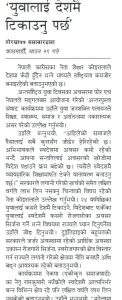4-H Nepal organized “Inter-generational Dialogue Forum” on the occasion of International Youth Day on August 13th, 2024 at Nepal Pragya Pratisthan, Kamaladi. The dialogue forum was designed aligning with UN theme “From Clicks to Progress: Youth Digital Pathways for Sustainable Development”. The event brought together 100 youth and four parliamentarians under one platform to interact on burning issues including youth in policy-making, climate change, sustainable development, and digitalization advancements.
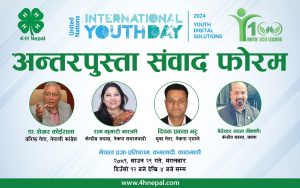
The forum began with the registration and distribution of t-shirts to participants at 11:30 A.M. The program formally started at 1:00 P.M. with a formal seating arrangement of the president, 4-H Nepal, Lok Raj Awasthi, cheif guest Dr. Shekhar Koirala, a senior leader of the Nepali Congress, notable guests, including Ram Kumari Jhakri, a central member of Nepal Communist Party (Unified Socialist), Dr. Dipak Prakash Bhatta, a young leader of the Nepal Communist Party, and Bideshwor Prasad Yadav (Bikki), a central member of People’s Socialist Party.
The opening ceremony was led by the chief guest, Dr. Shekhar Koirala. The forum continued with a welcome speech by the president of 4-H Nepal, Lok Raj Awasthi. He primarily highlighted the celebration of Youth Day and the forum’s role in bridging the gap between generations. He provided an overview of the event, noting that guest speakers will share valuable insights and experiences.
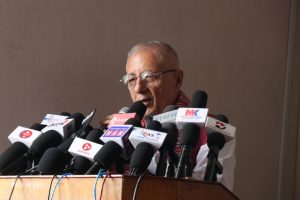
Followed by president speech, a summary report on youth survey of 4-H Nepal Inter-generational Dialogue Forum was presented by a program officer, Pooja Mandal. She further emphasized the UN’s theme on the importance of digitalization in achieving sustainable development. She conveyed that the event itself represented a small yet significant step towards greater digitalization. Approximately 80-90% of its activities were conducted through digital platforms, including pre-event planning, calls for participation, invitation management, guest meetings and discussions, banner design and showcase, and post-event e-certificate distribution.
The forum continued with youth participants sharing their experiences on various topics, including sustainable development, the role of youth in policy-making, unemployment, and agriculture. They discussed on issues such as migration from rural to urban areas, which has often resulted in fallow land, leading to changes in agricultural practices and terrace farming, impacting sustainability. Additionally, the discussion explored the role of youth in policy and law-making and how they can contribute to creating better policies.
The first speech was delivered by chief guest Dr. Shekhar Koirala. He highlighted the alarming trend of educated youth being compelled to move abroad for work due to the lack of employment opportunities in the country. He stated that the government should formulate plans to develop entrepreneurship program and create local job opportunities for the youth. This approach would help the nation to retain its talented young workforce, contributing to the country’s development rather than being compelled to seek opportunities abroad. He also remarked that the perception of stagnation in Nepal, often voiced by the youth, sends a negative message internationally. He asserted that the future of the country depends on the active involvement of youth and encouraged them to take a proactive role in the nation’s development.
The second speech was delivered by Ram Kumari Jhakri. She emphasized the need to invest in sectors that will create opportunities, particularly targeting youth under the age of 24 in Nepal. She provided insights on numerous programs and policies targeted at youth are implemented by the government, with substantial grants allocated to sectors like entrepreneurship, employment, and agriculture. However, these initiatives often do not reach the targeted communities effectively therefore, she stressed on the effective management of the system. She called for a shift in mindset, urging the youth to actively engage in national concerns and support the leaders in policy-making processes.
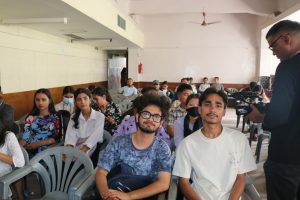 The third speech was delivered by Dr. Dipak Prakash Bhatta. He advocates for integrating agriculture into school education to spark early interest and expertise, and calls for transforming it into an agribusiness sector to create new opportunities for youth. He stressed integrating education policies with youth policies to create an effective national development strategy for advancing agriculture. He underscored the need to connect scientific research with everyday life, as seen in developed countries. Addressing these issues will help future generations integrate science into daily life and drive societal change. He emphasized that a series of inter-generational dialogues is essential to prevent future generations from becoming redundant like previous generations.
The third speech was delivered by Dr. Dipak Prakash Bhatta. He advocates for integrating agriculture into school education to spark early interest and expertise, and calls for transforming it into an agribusiness sector to create new opportunities for youth. He stressed integrating education policies with youth policies to create an effective national development strategy for advancing agriculture. He underscored the need to connect scientific research with everyday life, as seen in developed countries. Addressing these issues will help future generations integrate science into daily life and drive societal change. He emphasized that a series of inter-generational dialogues is essential to prevent future generations from becoming redundant like previous generations.
The fourth speech was delivered by Bideshwor Yadav (Bikki). He emphasized on improving Nepal’s agricultural sector which has been consistently neglected by the government, with inadequate management of essential resources like irrigation and fertilizers. This has led to agriculture’s GDP contribution falling to 20-25%. He highlighted the shortcomings of the 2072 Constitution, which guarantees fundamental rights like free education and healthcare but remains largely unimplemented. He urged institutions and leaders to address these issues to resolve the concerns raised by youth. The event concluded at 4:00 P.M. during which tokens of appreciation were presented to the chief guest and speakers.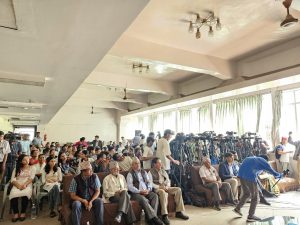
Outcomes of the event
Engagement: Ninety-two participants attended the event to express their concerns regarding youth to parliamentarians and leaders.
Youth Empowerment:The initiative empowered youth to actively participate and involved in development plans and policy-making process to resolve youth-related issues.
Youth Awareness: The dialogue forum increased awareness about government grants and funds allocated in different sectors for youth programs and initiatives.
Improve Understanding: The event addressed generational perspectives and experiences to resolve misunderstandings and foster meaningful discussions.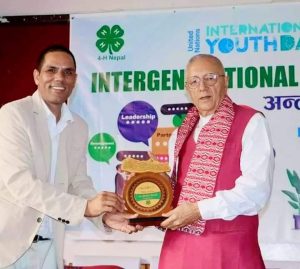
Media coverage
The event received coverage from both broadcast and online media. Nepal Television featured the news on their channel with a three-minute segment. Additionally, the story was covered by more than 10 online media outlets, broadcast live and shared widely across various digital platforms.
